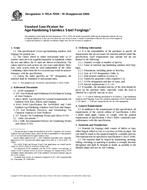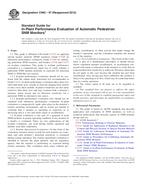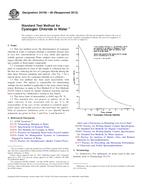1.1 This test method covers the estimation of the net heat of combustion (megajoules per kilogram or Btu per pound) of aviation gasolines and aircraft turbine and jet engine fuels.
1.2 This test method is purely empirical and is applicable to liquid hydrocarbon fuels that conform to the specifications for aviation gasolines or aircraft turbine and jet engine fuels of grades Jet A, Jet A-1, Jet B, JP-4, JP-5, JP-7, and JP-8.
Note 1–The experimental data on heat of combustion from which the Test Method D3338 correlation was devised was obtained by a precision method similar to Test Method D4809.
Note 2–The estimation of the net heat of combustion of a hydrocarbon fuel is justifiable only when the fuel belongs to a well-defined class for which a relation between heat of combustion and aromatic and sulfur contents, density, and distillation range of the fuel has been derived from accurate experimental measurements on representative samples of that class. Even in this case, the possibility that the estimates may be in error by large amounts for individual fuels should be recognized. The fuels used to establish the correlation presented in this method are defined as follows:
Fuels:
Aviation gasoline-Grades 100/130 and 115/145 (1,2)
Kerosines, alkylates, and special WADC fuels (3)
Pure hydrocarbons-paraffins, naphthenes, and aromatics (4)
Fuels for which data were reported by the Coordinating Research Council (5).
1.3 Although the test method permits the calculation of net heat of combustion in either SI or inch-pound units, SI units are the preferred units.
1.4 The net heat of combustion can also be estimated in inch-pound units by Test Method D1405 or in SI units by Test Method D4529. Test Method D1405 requires calculation of one of four equations dependent on the fuel type with a precision equivalent to that of this test method. Test Method D4529 requires calculation of a single equation for all aviation fuels with a precision equivalent to that of this test method. Unlike D1405 and D4529, D3338 does not require the use of aniline point.
1.5 This standard does not purport to address all of the safety concerns, if any, associated with its use. It is the responsibility of the user of this standard to establish appropriate safety and health practices and determine the applicability of regulatory limitations prior to use.
Product Details
- Published:
- 12/10/2000
- Number of Pages:
- 4
- File Size:
- 1 file , 40 KB


